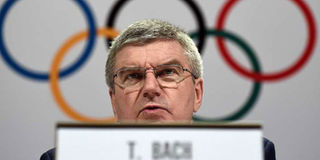'Dozens' of athletes likely to be banned from Rio games for doping

This file photo taken on August 3, 2015 shows International Olympic Committee (IOC) president Thomas Bach giving his closing remarks during a press conference. Bach said on May 18, 2016 that "dozens" of athletes could be banned from the forthcoming Olympic Games in Rio de Janeiro after new tests on samples from previous games. PHOTO | MANAN VATSYAYANA |
What you need to know:
- The re-examination is part of widespread measures taken by sporting bodies after a wave of new doping scandals to hit international sport with Russia at the centre.
- The IOC will apply a policy of "zero tolerance," Bach told Le Monde.
- Russia is already battling to get its track and field athletes back into the International Association of Athletics Federations (IAAF) so that they can compete in the Rio de Janeiro Games.
- The Sochi samples are stored for 10 years in the facility in Lausanne.
PARIS
IOC president Thomas Bach said Wednesday that "dozens" of athletes could be banned from the forthcoming Olympic Games in Rio de Janeiro after new tests on samples from previous games.
The International Olympic Committee (IOC) has decided to re-examine samples from the Beijing Olympics in 2008 and the London games in 2012 "using the most recent scientific methods", Bach said in an opinion piece in French daily Le Monde.
"This decisive action will probably prevent dozens of athletes who have doped from competing in the Rio Olympic Games in 2016," added Bach.
The re-examination is part of widespread measures taken by sporting bodies after a wave of new doping scandals to hit international sport with Russia at the centre.
The IOC will apply a policy of "zero tolerance," Bach told Le Monde.
The committee had said on Tuesday that up to 31 athletes from 12 countries could face bans from the Rio event after new tests from the 2008 Games in Beijing.
These athletes were caught in new tests on 454 Beijing samples. Around 4,000 tests were carried out in total during those games, meaning the number of retroactive failures could well increase.
In addition, results from 250 retests on samples taken at the 2012 London Games are due "shortly," according to the IOC.
The IOC board has also demanded that the World Anti-Doping Agency (Wada) start "a fully fledged investigation" into allegations that Russia's secret services and sports ministry subverted testing at the laboratory for the 2014 Winter Olympics in Sochi.
The allegations against the Sochi laboratory are "very detailed and therefore very worrying," Bach said in Le Monde.
"If the inquiry confirms that the allegations are true, this would be a shocking new scale of doping, with an unprecedented level of criminal activity," added Bach.
The IOC has instructed its lab in Lausanne to re-examine samples from Sochi "using the most modern and efficient methods at its disposal."
The Sochi samples are stored for 10 years in the facility in Lausanne.
Russian authorities have strongly denied any wrongdoing and Bach called for "total cooperation" from them.
Russia is already battling to get its track and field athletes back into the International Association of Athletics Federations (IAAF) so that they can compete in the Rio de Janeiro Games.



